初中英语介词用法归纳总结
初中英语介词用法总结与归纳
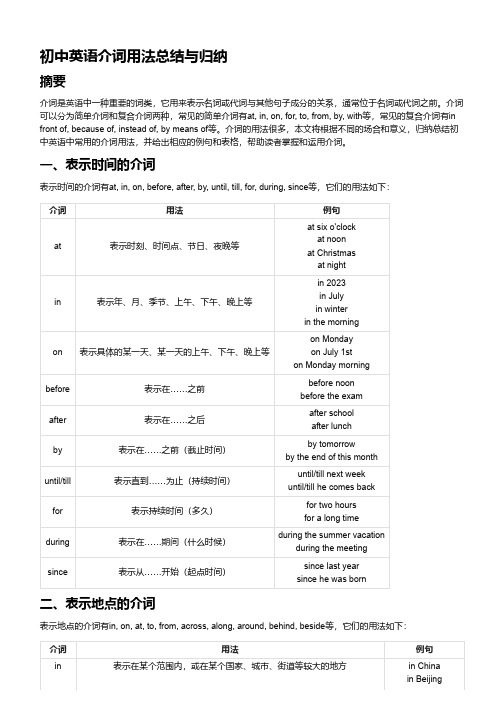
初中英语介词用法总结与归纳摘要介词是英语中一种重要的词类,它用来表示名词或代词与其他句子成分的关系,通常位于名词或代词之前。
介词可以分为简单介词和复合介词两种,常见的简单介词有at, in, on, for, to, from, by, with等,常见的复合介词有in front of, because of, instead of, by means of等。
介词的用法很多,本文将根据不同的场合和意义,归纳总结初中英语中常用的介词用法,并给出相应的例句和表格,帮助读者掌握和运用介词。
一、表示时间的介词表示时间的介词有at, in, on, before, after, by, until, till, for, during, since等,它们的用法如下:介词用法例句at表示时刻、时间点、节日、夜晚等at six o'clock at noonat Christmas at nightin表示年、月、季节、上午、下午、晚上等in 2023in Julyin winterin the morningon表示具体的某一天、某一天的上午、下午、晚上等on Mondayon July 1ston Monday morningbefore表示在……之前before noon before the examafter表示在……之后after school after lunchby表示在……之前(截止时间)by tomorrowby the end of this monthuntil/till表示直到……为止(持续时间)until/till next week until/till he comes backfor表示持续时间(多久)for two hours for a long timeduring表示在……期间(什么时候)during the summer vacation during the meetingsince表示从……开始(起点时间)since last year since he was born二、表示地点的介词表示地点的介词有in, on, at, to, from, across, along, around, behind, beside等,它们的用法如下:介词用法例句in表示在某个范围内,或在某个国家、城市、街道等较大的地方in Chinain Beijing介词用法例句in ZhongshanRoadon表示在某个表面上,或在某个楼层、台阶等较小的地方,或在某个方位上on the wall on the secondflooron the left/rightat 表示在某个具体的位置或地点,或在某个机构、场所等较小的地方,或表示靠近、附近等at the cornerat schoolat the bus stopto表示朝向某个方向或地点,或表示到达某个地点(范围之外)to the east to Japan to schoolfrom表示从某个地点出发或离开(范围之外)from home from Shanghai from Chinaacross表示横穿或穿过(从一边到另一边)across the street across the riveralong表示沿着或顺着(在一边)along the road along the riveraround表示围绕或环绕(在四周)around the lake around the worldbehind表示在……后面behind the door behind himbeside表示在……旁边beside the window beside her三、表示方向的介词表示方向的介词有to, from, into, out of, onto, off, up, down, through等,它们的用法如下:介词用法例句to表示朝向某个方向或地点,或表示目的地He is going to Beijing. She gave the book to me.from表示从某个方向或地点出发或离开,或表示来源He came from the south. This is a gift from my friend.into表示进入某个范围或空间(由外到内)He jumped into the water. She put the flowers into the vase.out of表示离开某个范围或空间(由内到外)He ran out of the room. She took the book out of the bag.onto表示移动到某个表面上(由低到高)He climbed onto the roof. She threw the ball onto the ground.off表示从某个表面上移开(由高到低)He fell off the bike. She took off her hat.up表示向上移动(由低到高)He went up the hill.介词用法例句She climbed up the ladder.down表示向下移动(由高到低)He came down the stairs. She slid down the slide.through表示穿过某个空间或物体(从一端到另一端)He walked through the forest. She looked through the window.四、表示方式、手段、工具的介词表示方式、手段、工具的介词有by, with, in, on等,它们的用法如下:介词用法例句by 表示交通工具、方式、方法等,或表示被动语态的动作执行者,或表示时间的截止点,或表示计量单位等by busby mistakeby himby tomorrowby weightwith 表示使用某种工具、器具、材料等,或表示伴随的人或物,或表示具有某种特征、状态等,或表示原因、理由等with a knifewith hisparentswith long hairwith joyin 表示使用某种语言、文字、颜色等,或表示穿着某种衣服,或表示处于某种状态、情况等,或表示在某种范围内等in Englishin black andwhitein a red dressin a hurryin generalon 表示使用某种电子设备、媒体等,或表示依靠某种力量、条件等,或表示以某种方式等,或表示参与某种活动等on TVon footon fireon dutyon holiday五、表示原因、目的、结果的介词表示原因、目的、结果的介词有for, at, from, of, with, by, because of, owing to, thanks to, out of, through等,它们的用法如下:介词用法例句for 表示原因、理由,常与sorry, famous, punish, praise, thank, blame等连用,也表示目的、意图,常与hope, wish, wait, look, come, go等连用,也可以表示用途、功能等for peacefor helpfor a walkfor funfor cutting paperat表示目的、意图,常与surprised, shocked, amazed, good, bad等连用,也可以表示针对、针对性等at his words at the news at math介词用法例句at solvingproblemsfrom 表示结果、效果,常与different, far, free, safe等连用,也可以表示来源、出发点等from the picturefrom now onfrom dangerfrom birthof 表示原因、理由,常与afraid, proud, sure, tired等连用,也可以表示所属、属性、特征等of the darkof himof the resultof his workwith 表示原因、理由,常与pleased, satisfied, angry, happy等连用,也可以表示伴随、方式、工具等with the answerwith himwith a smilewith a knifeby 表示方式、方法、手段等,也可以表示被动语态的动作执行者,或表示时间的截止点,或表示计量单位等by doing thisby himby tomorrowby weightbecauseof 表示原因、理由,相当于一个从句,后面接名词或代词等because of therainbecause of thatowing to表示原因、理由,相当于一个从句,后面接名词或代词等owing to the trafficjamowing to hisillnessthanks to表示原因、理由,含有感激或讽刺的意味,后面接名词或代词等thanks to yourhelp thanks to his carelessnessout of表示原因、理由,含有出于某种动机或感情的意味,后面接名词或代词等out of curiosity out of pitythrough表示原因、理由,含有经过某种过程或方式的意味,后面接名词或代词等through hard work through a window六、表示对象、范围的介词表示对象、范围的介词有of, for, about, with, to, from, among, between等,它们的用法如下:介词用法例句of表示所属、属性、特征等,也可以表示分离、脱离等the color of the skya cup of teaa friend of mineget rid of itfor表示目标、对象、受益者等,也可以表示目的、原因等 a gift for youa seat for twoa doctor for the poora room for rentabout表示主题、内容、话题等,也可以表示大约、左右等a book about history tell me about yourself about ten minuteswith表示伴随、陪同等,也可以表示方式、工具等stay with mea man with glasses speak with a loud voice cut it with a knifeto表示方向、目的地等,也可以表示对象、接受者等go to school fly to London say hello to him give it to herfrom表示来源、出发点等,也可以表示对象、对比者等come from Chinaa letter from my father different from youlearn from himamong表示在三个或三个以上的人或物之间(内部)share it among yourselves a flower among the grassbetween表示在两个人或物之间(内部或外部)sit between thema river between two mountains七、其他常用的介词除了上述介词外,还有一些其他常用的介词,如as, like, except, without, beyond, above, below, over, under等,它们的用法如下:介词用法例句as表示身份、职业、角色等,也可以表示方式、方法、程度等as a teacher as usual as you know as well aslike表示相似、类似等,也可以表示喜欢、喜爱等like a birdlike father, like sonI like music.except表示除……之外(不包括)everyone except me every day except Sundaywithout表示没有、缺少等without money without water without a wordbeyond表示超出、超过等beyond the wall beyond my expectation beyond controlabove表示在……之上(不接触)above the ground above sea levelabove allbelow表示在……之下(不接触)below the surface below zero below averageover表示在……之上(覆盖或接触)over the bridge over his head over the phoneunder表示在……之下(覆盖或接触)under the tree under his arm under the weather。
(完整版)初中英语介词用法总结

初中英语介词用法总结介词(preposition):也叫前置词。
在英语里,它的搭配能力最强。
但不能单独做句子成分需要和名词或代词(或相当于名词的其他词类、短语及从句)构成介词短语,才能在句中充当成分。
介词是一种虚词,不能独立充当句子成分,需与动词、形容词和名词搭配,才能在句子中充当成分。
介词是用于名词或代词之前,表示词与词之间关系的词类,介词常与动词、形容词和名词搭配表示不同意义。
介词短语中介词后接名词、代词或可以替代名词的词(如:动名词v-ing).介词后的代词永远为宾格形式。
介词的种类:(1)简单介词:about, across, after, against, among, around, at, before, behind, below, beside, but, by, down, during, for, from, in, of, on, over, near, round, since, to, under,up, with等等。
(2)合成介词:inside, into, outside, throughout, upon, without, within(3)短语介词:according to, along with, apart from, because of, in front of, in spite of, instead of, owing to, up to, with reguard to(4)分词介词:considering, reguarding, including, concerning介词短语:构成介词+名词We go to school from Monday to Saturday.介词+代词Could you look for it instead of me?介词+动名词He insisted on staying home.介词+连接代/副词I was thinking of how we could get there.介词+不定式/从句He gives us some advice on how to finish it.介词的用法:一、介词to的常见用法1.动词+toa)动词+ toadjust to适应,attend to处理;照料,agree to赞同,amount to加起来达…,belong to属于,come to达到,drink to为…干杯,get to到达,happen to发生在某人身上,hold to紧握,lead to通向,listen to听,occur to想起,object to反对,point to指向,respond to回答,refer to参考;指的是…;涉及,reply to回答,see to负责,stick to坚持,turn to求助,write to给某人写信。
初中英语介词的用法总结
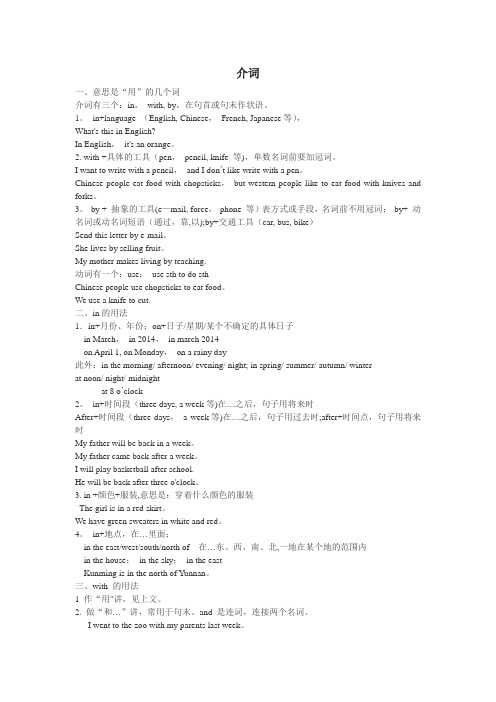
介词一、意思是“用”的几个词介词有三个:in,with, by,在句首或句末作状语。
1。
in+language (English, Chinese,French, Japanese等),What's this in English?In English,it's an orange。
2. with +具体的工具(pen,pencil, knife 等),单数名词前要加冠词。
I want to write with a pencil,and I don’t like write with a pen。
Chinese people eat food with chopsticks,but western people like to eat food with knives and forks。
3。
by + 抽象的工具(e—mail, force,phone 等)表方式或手段,名词前不用冠词;by+ 动名词或动名词短语(通过,靠,以);by+交通工具(car, bus, bike)Send this letter by e-mail。
She lives by selling fruit。
My mother makes living by teaching.动词有一个:use;use sth to do sthChinese people use chopsticks to eat food。
We use a knife to cut.二、in的用法1.in+月份、年份;on+日子/星期/某个不确定的具体日子in March,in 2014,in march 2014on April 1, on Monday,on a rainy day此外:in the morning/ afternoon/ evening/ night; in spring/ summer/ autumn/ winterat noon/ night/ midnightat 8 o’clock2。
初中英语知识点归纳介词的用法
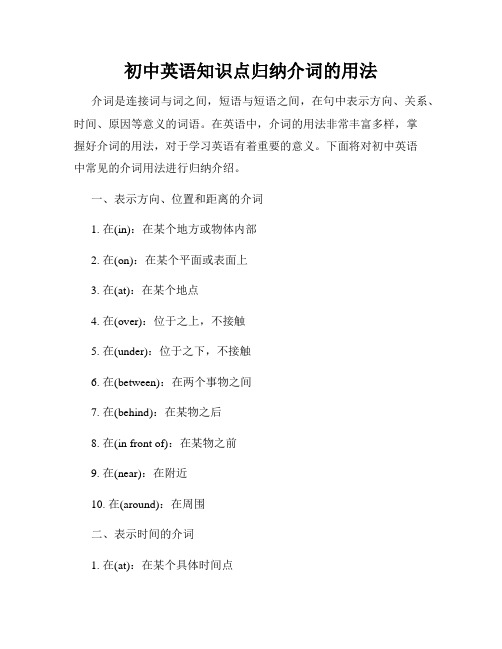
初中英语知识点归纳介词的用法介词是连接词与词之间,短语与短语之间,在句中表示方向、关系、时间、原因等意义的词语。
在英语中,介词的用法非常丰富多样,掌握好介词的用法,对于学习英语有着重要的意义。
下面将对初中英语中常见的介词用法进行归纳介绍。
一、表示方向、位置和距离的介词1. 在(in):在某个地方或物体内部2. 在(on):在某个平面或表面上3. 在(at):在某个地点4. 在(over):位于之上,不接触5. 在(under):位于之下,不接触6. 在(between):在两个事物之间7. 在(behind):在某物之后8. 在(in front of):在某物之前9. 在(near):在附近10. 在(around):在周围二、表示时间的介词1. 在(at):在某个具体时间点2. 在(in):在某个时间段3. 在(on):在某个具体日期三、表示原因的介词1. 因为(of):表示原因、缘故2. 由于(because of):表示原因、由于四、表示目的、用途和方式的介词1. 为了(in order to):表示目的2. 以便(in order that):表示目的3. 用(with):表示使用的手段或工具4. 通过(by):表示方式、方法5. 以(for):表示目的五、表示比较的介词1. 比较起见(than):表示比较的对象2. 和(with):与某人或某物在一起六、其它常见的介词1. 关于(about):表示涉及某一话题2. 靠(by):表示接近某人或某物3. 经过(through):表示通过某地或某事4. 编写(at):表示在某地工作或活动5. 因(as):表示角色、身份6. 例如(for example):表示举例7. 包括(including):表示包含某物以上是初中英语中常见的介词用法的归纳总结。
熟练掌握这些介词的用法,对于构建正确的句子和语法结构非常重要。
希望能对你的学习有所帮助。
初中英语介词用法总结
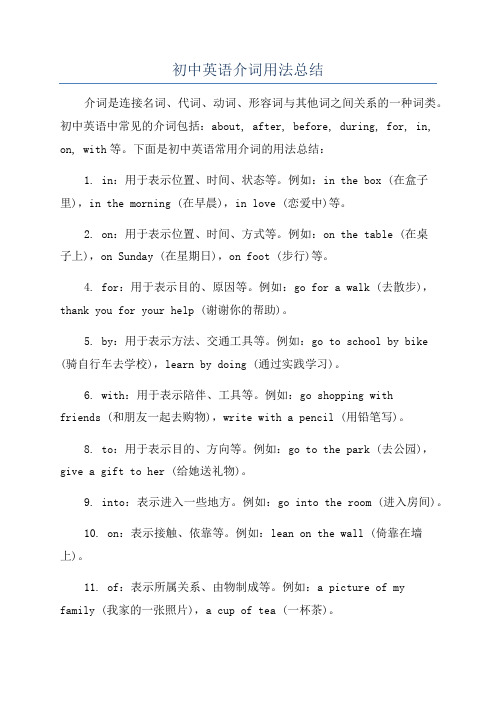
初中英语介词用法总结介词是连接名词、代词、动词、形容词与其他词之间关系的一种词类。
初中英语中常见的介词包括:about, after, before, during, for, in, on, with等。
下面是初中英语常用介词的用法总结:1. in:用于表示位置、时间、状态等。
例如:in the box (在盒子里),in the morning (在早晨),in love (恋爱中)等。
2. on:用于表示位置、时间、方式等。
例如:on the table (在桌子上),on Sunday (在星期日),on foot (步行)等。
4. for:用于表示目的、原因等。
例如:go for a walk (去散步),thank you for your help (谢谢你的帮助)。
5. by:用于表示方法、交通工具等。
例如:go to school by bike (骑自行车去学校),learn by doing (通过实践学习)。
6. with:用于表示陪伴、工具等。
例如:go shopping withfriends (和朋友一起去购物),write with a pencil (用铅笔写)。
8. to:用于表示目的、方向等。
例如:go to the park (去公园),give a gift to her (给她送礼物)。
9. into:表示进入一些地方。
例如:go into the room (进入房间)。
10. on:表示接触、依靠等。
例如:lean on the wall (倚靠在墙上)。
11. of:表示所属关系、由物制成等。
例如:a picture of myfamily (我家的一张照片),a cup of tea (一杯茶)。
12. with:表示伴随、具有。
例如:a girl with long hair (一个长发的女孩),a book with pictures (一本有图片的书)。
初中英语介词用法归纳整理
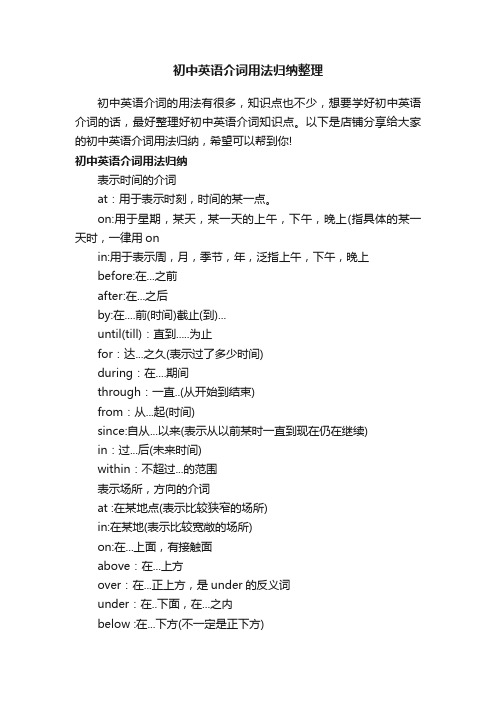
初中英语介词用法归纳整理初中英语介词的用法有很多,知识点也不少,想要学好初中英语介词的话,最好整理好初中英语介词知识点。
以下是店铺分享给大家的初中英语介词用法归纳,希望可以帮到你!初中英语介词用法归纳表示时间的介词at:用于表示时刻,时间的某一点。
on:用于星期,某天,某一天的上午,下午,晚上(指具体的某一天时,一律用onin:用于表示周,月,季节,年,泛指上午,下午,晚上before:在...之前after:在...之后by:在....前(时间)截止(到)...until(till):直到.....为止for:达...之久(表示过了多少时间)during:在....期间through:一直..(从开始到结束)from:从...起(时间)since:自从...以来(表示从以前某时一直到现在仍在继续)in:过...后(未来时间)within:不超过...的范围表示场所,方向的介词at :在某地点(表示比较狭窄的场所)in:在某地(表示比较宽敞的场所)on:在...上面,有接触面above:在...上方over:在...正上方,是under的反义词under:在..下面,在...之内below :在...下方(不一定是正下方)near:近的,不远的by:在...的旁边,比near的距离要近between:在两者之间among:在三者或者更多的之中around:环绕,在...的周围,在....的四周in front of:在...的前面behind:在...后边in:在..之内,用于表示静止的位置into:进入out of :和into一样,也表示有一定的运动方向along:沿着across:横过(平面物体)through:贯通,通过to :达到..地点(目的地)或方向for:表示目的,为了.....from:从...地点起其他介词with:和..在一起; 具有,带有; 用某种工具或方法in:表示用什么材料(例如:墨水,铅笔等)或用什么语言。
初中英语介词用法总括
初中英语介词用法总括1.in序号功能含义理解核心典型例句1 表示时间在某段时间朝代、古今、世纪、年代、年、季、月、星期、早、下午、晚上、过去、将来等不具体的、模糊的大于1天的时间段。
(注意和at在这方面的区别:at指的是短于1天的时间点)in Tang dynasty;in the 19th century;in 1980;in this year;in spring;in a week;in a month;in the morning2 表示位置在某个地方国家、地区、省、市、区、太空、天空等…(自然意义上的地方)in china;in huabei;in Beijing;in the sky在某个场所车、教室、超市等(注意和at在这方面的区别,at一般用在:家、角、店、站、口等可能有和露天接触的地方)in the train;in the classroom;甲处于乙中…除实物里面外,注意“光、灯、影、树荫、雨、森林”,有全身置入某种环境之中的含义在内。
We are in the classroom;They are sitting in the shade of atree;They are studying in thebrightlight.3 表示将来在…以后用在一般将来时中,是从“现在时间点往后..”They will come back in 10 days4 语言单位材料/关于“材料“,注意和with在这个用法上的区别。
(with偏向“工具”,in偏向“材料”)I wrote a novel in Russian;Thelength is measured in meter, andcentimetre;This board was castin gold.5 状态方面服饰/状态:既可以指人的状态,也可指物的状态;方面:既可指具体,也可指抽象方面;服饰:尤以颜色和状态常考He wasn’t in good health,so talk inlow voice. Our country inrich in naturalresources; A good teachermust be an example in study He isin red shoes today初中阶段应掌握的In的常见短语介词短语in all 总计;in general 一般来说;in time 及时;in advance 事前;in themeantime 与此同时;in place 适当地; in the hope of怀着……希望;inconnection with 和……有关;in contact with 和……联系;in addition to学习好资料欢迎下载。
中考介词归纳总结
中考介词归纳总结在中考中,介词是一个非常重要且常考的语法知识点。
介词在句子中起连接作用,表达时间、地点、方式、原因等关系。
掌握介词用法对于理解和运用英语至关重要。
本文将对中考所涵盖的常见介词进行归纳总结。
一、时间介词1. on:表示某一天或某一天的上午、下午、晚上等特定时间。
例:I will have a meeting on Monday.2. at:表示具体的时间点或特定的时刻。
例:We will meet at 9 o'clock.3. in:表示某一年、月、季节、时间段等。
例:She was born in 2005.例:We usually go swimming in summer.4. during:表示在某一段时间内。
例:He read a book during his summer vacation.二、地点介词1. at:表示具体的地点。
例:She is waiting for you at the bus station.2. on:表示表面或某物之上。
例:There is a book on the table.3. in:表示在某个范围、区域、国家或大洲内。
例:We live in a small town.4. to:表示朝向、方向。
例:He went to the library.三、方式介词1. by:表示通过某种交通方式或手段。
例:I usually go to school by bus.2. with:表示伴随、陪同。
例:She walks to school with her friends.3. in:表示用某种方式或手段。
例:He communicated with her in English.四、原因介词1. for:表示目的、原因或理由。
例:He went to the store for some milk.2. because of:表示因为。
初中英语介词的用法归纳整理
初中英语介词的用法归纳整理介词是一种用来表示词与词, 或者词与句之间的关系的词,在句中不能单独作句成分。
初中英语介词的用法很多,为此,以下是店铺分享给大家的初中英语介词的用法归纳,希望可以帮到你!初中英语介词的用法归纳表示方位的介词:in,to, on1. in 表示在某地范围之内。
如:Shanghai is/lies in the east of China.上海在中国的东部。
2. to 表示在某地范围之外。
如:Japan is/lies to the east of China.日本位于中国的东面。
3. on 表示与某地相邻或接壤。
如:Mongolia is/lies on the north of China.蒙古国位于中国北边。
2表示计量的介词:at, for, by1. at表示“以……速度”“以……价格”。
如:It flies at about 900 kilometers a hour.它以每小时900公里的速度飞行。
I sold my car at a high price.我以高价出售了我的汽车。
2. for表示“用……交换,以……为代价”。
如:He sold his car for 500 dollars.他以五百元把车卖了。
注意:at表示单价(price) ,for表示总钱数。
3. by表示“以……计”,后跟度量单位。
如:They paid him by the month.他们按月给他计酬。
Here eggs are sold by weight.在这里鸡蛋是按重量卖的。
3表示材料的介词:of, from, in1. of成品仍可看出原料。
如:This box is made of paper.这个盒子是纸做的。
2. from成品已看不出原料。
如:Wine is made from grapes.葡萄酒是葡萄酿成的。
3. in表示用某种材料或语言。
如:Please fill in the form in pencil first.请先用铅笔填写这个表格。
初一英语常见介词用法归纳
初一英语常见介词用法归纳介词在英语中起到连接词的作用,连接名词、代词、动词、形容词或副词等成分。
在初中英语学习过程中,介词是一个非常重要的语法项目。
我们需要对初中英语中常见的介词用法进行归纳整理,以便更好地掌握这一部分知识。
一、介词的基本用法1. 表示位置:in, on, at- in: 在…里面(较大的范围)e.g. in the box- on:在…上面e.g. on the table- at:在…处e.g. at the bus stop4. 表示原因:because of, due to- because of: 由于e.g. He was late because of the heavy traffic.- due to: 由于e.g. The cancellation of the event was due to bad weather.5. 表示方式:by, with- by: 通过…手段e.g. by bus- with: 用…方式e.g. with a smile9. 表示所属:of- of: …的e.g. the hat of the boy2. look forward to: 期待e.g. I am looking forward to the summer vacation.5. be interested in: 对…感兴趣e.g. Amy is interested in learning Chinese.三、常见介词错误用法及纠正1. 错误用法:depend of正确用法:depend one.g. We depend on each other.通过以上的介词错误用法及纠正,我们可以更清晰地了解该如何正确使用这些介词。
四、综合练习通过上述的综合练习,可以帮助大家更好地掌握介词用法。
- 1、下载文档前请自行甄别文档内容的完整性,平台不提供额外的编辑、内容补充、找答案等附加服务。
- 2、"仅部分预览"的文档,不可在线预览部分如存在完整性等问题,可反馈申请退款(可完整预览的文档不适用该条件!)。
- 3、如文档侵犯您的权益,请联系客服反馈,我们会尽快为您处理(人工客服工作时间:9:00-18:30)。
初中英语介词用法归纳总结
常用介词基本用法辨析
表示方位的介词:in, to, on
1. in 表示在某地范围之内。
Shanghai is/lies in the east of China. 上海在中国的东部。
2. to 表示在某地范围之外。
Japan is/lies to the east of China. 日本位于中国的东面。
3. on 表示与某地相邻或接壤。
Mongolia is/lies on the north of China. 蒙古国位于中国北边。
表示计量的介词:at, for, by
1. at 表示“以……速度”“以……价格”。
It flies at about 900 kilometers an hour. 它以每小时900公里的速度飞行。
I sold my car at a high price. 我以高价出售了我的汽车。
2. for 表示“用……交换,以……为代价”。
He sold his car for 500 dollars. 他以五百元把车卖了。
注意:at表示单价(price) ,for表示总钱数。
3. by 表示“以……计”,后跟度量单位。
They paid him by the month. 他们按月给他计酬。
Here eggs are sold by weight. 在这里鸡蛋是按重量卖的。
表示材料的介词:of, from, in
1. of 成品仍可看出原料。
This box is made of paper. 这个盒子是纸做的。
2. from 成品已看不出原料。
Wine is made from grapes. 葡萄酒是葡萄酿成的。
3. in 表示用某种材料或语言。
Please fill in the form in pencil first. 请先用铅笔填写这个表格。
They talk in English. 他们用英语交谈。
表示工具或手段的介词:by, with, on
1. by 用某种方式,多用于交通。
I went there by bus. 我坐公共汽车去那儿。
2. with表示“用某种工具”。
He broke the window with a stone. 他用石头把玻璃砸坏了。
注意:with表示用某种工具时,必须用冠词或物主代词。
3. on 表示“以……方式”,多用于固定词组。
They talked on the telephone. 他们通过电话进行交谈。
She learns English on the radio/on TV. 她通过收音机/电视学英语。
表示关于的介词:of, about, on
1. of 仅是提到或谈到过某人或某事。
He spoke of the film the other day. 他前几天提到了这部影片。
2. about 指“关于”某人或某事物的较详细的情况。
Can you tell me something about yourself? 你能告诉我关于你自己的事情吗?
3. on 指“关于”学术性的或严肃的事。
It’s a textbook on the history of china. 它是一本有关中国历史的教科书。
表原因或理由的介词:for, at, from, of, with, by, because of
1. for 表示原因,与sorry, famous, punish, praise, thank, blame连用。
I am sorry for what I said to you. 我后悔不该对你讲那些话。
2. at 指情感变化的原因,意为“因听到或看到而……”。
He was surprised at the news. 听到这消息他大吃一惊。
3. from 指“外在的原因”,如受伤、车祸等。
He died from the wound. 他因受伤而致死。
4. of 指“内在的原因”,如病、饿等。
The old man died of hunger. 老人死于饥饿。
5. with 指生理上或情感上的由外界到内心的原因。
Hearing the news, he jumped with joy. 他们听到这个消息,欣喜若狂。
He was shaking with anger. 他气得浑身发抖。
6. by 表示外部的,尤其是暴力的或无意中造成某种结果的原因。
Her body was bent by age. 他因年老背弯了。
She took your umbrella by mistake. 我因弄错拿了你的雨伞。
7. because of 表示引起结果的直接原因。
He retired last month because of illness/because he ill.
8. owing to 多表示引起某不良后果的原因。
Owing to the rain they could not come. 由于下雨他们没来。
9. thanks to 表示引起某种幸运结果的原因,常译为“幸亏……,多亏……”。
Thanks to John, we won the game. 多亏约翰,我们才赢了这场比赛。
10. out of 表示动机的起因,常译为“出于……”。
He asked the question out of curiosity. 他出于好奇才问了那个问题。
11. through 多表示因局部而影响全局的原因。
The war was lost through bad organization. 战争因组织不周而失败了。
表示好像或当作的介词:like, as
1. like表示“像……一样”,其实不是。
Peter the Great, like his country, was strong and proud. 彼得大帝像他的国家一样强健和自豪。
2. as表示“作为,以……身份”,其实也是。
He talked to me as a father. 他以父亲的身份跟我谈话。
注:as作连词时,可表示“好像……”。
The work is not so difficult as you imagine. 这工作不像你想像的那么困难。
表示支持或反对的介词:against, foragainst 反对,for支持,互为反义词。
Are you for my idea or against it? 你赞同还是反对我的想法?
表示除某人某物外的介词:besides, excep
1. besides是包括后面所提人或物在内的“除……外,还”。
Thirty students went to the cinema besides him. 除他以外,还有30个学生去看了电影(共计31人去)。
He is interested in tennis besides(=as well as)football.他对足球和网球都感兴趣。
2. except是指不包括后面所提人或物在内的“除去”。
Everyone is excited except me. 除我以外的每个人都很激动(我并不激动)。
All the visitors are Japanese except him. 除他以外的所有游客都是日本人。
(他不是日本人)
注意:(A) except通常与表示全体的all, every连用;若与other连用,只能用besides。
He had other people to take care of besides me. 除我之外,他还要照顾别人。
(B) except是排除同类;而except for是排除非同类,常在说明基本情况后,从细节上加上修正。
The composition is very good except for a few spelling mistakes. 除了几处拼写错误之外,这篇作文整体还是不错的。
(作文与拼写错误是非同类的)但except for 有时也可代替except,特别是在句首时,因为except 是不能用于句首的。
Except for George, you can all go. 除乔治外,你们都可以去。
